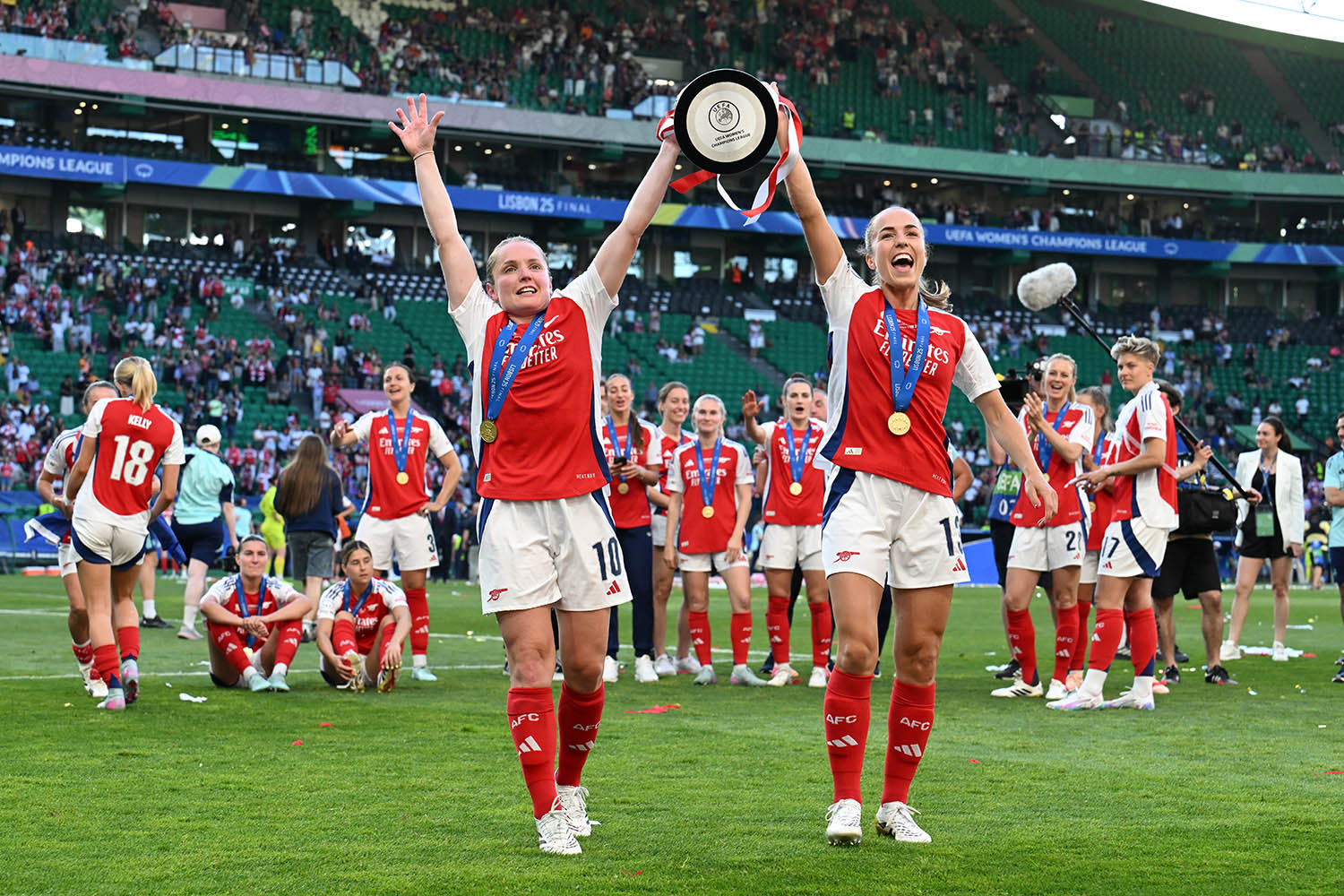It was on Rua do Arsenal in 1974 that Captain Salgueiro Maia dug in with his troops and forced the Portuguese dictatorship to surrender to the military, thus bringing back democracy to the country.
In Lisbon in 2025, Arsenal Football Club made a similar manoeuvre in order to overthrow the rulers of European women’s football and win a second Champions League title, 18 years after they first won the tournament. Their 1-0 win, thanks to a goal by Stina Blackstenius, mirrored the same result they had in 2007 when they beat Swedish side Umeå over two legs.
There was nothing expected about this result. Barcelona have rightly been seen as the best team in the women’s game, maybe the best team in all of sport. The assumption was that they would glide their way to a third consecutive UWCL title, not least given their opponents Arsenal had enjoyed a mixed season of results, finishing 12 points off Chelsea in the Women’s Super League.
But football regularly has little respect for what should happen, and Barcelona looked curiously out of sorts for large portions of the game. Alexia Putellas was practically anonymous and for all Aitana Bonmatí’s typical excellence, she couldn’t haul her team-mates along.
For a team who win as much as they do, Barcelona always seem to enjoy having an underdog status. Even against Lyon last year, the fact that they had never beaten them in a Champions League final was used less as an excuse but more a genuine feeling of insecurity. Here there was no doubt who the underdogs were and Barcelona didn’t look comfortable stepping into the mantle so many had assumed they would.
Arsenal also forced them to look uncomfortable. The poor run of results that took them to the end of the season had led many to joke that the team had mentally flown to Lisbon as soon as they qualified for the final. The evidence from this match was that that plan worked.
Arsenal pressed Barcelona excellently. This wasn’t the heavy metal approach Manchester City employed to such great effect all the way back in the very first game in the competition, but it was controlled and caused Barcelona real issues with the way they built up. Despite not being able to take their chances in the first half, Arsenal didn’t panic.
That has become a feature of Renée Slegers’ regime since she came in as interim manager in October. At that point, it looked feasible that Arsenal might not even make it out of the Champions League group stages, let alone win the whole competition.
Even the unlikelyness of the goalscorer felt miraculous. Blackstenius, who was named player of the match, is better known for being flagged offside than scoring in high-pressure moments. Yet when Beth Mead passed the ball into her feet having recycled play from a corner, she took it in her stride as if she had never missed a sitter in her life.
Arsenal had had to ride their luck a bit in order to have stayed in the game for as long as they did, with a bodies-on-the-line approach to defending. But no one wins a trophy as big as this without that happening.
Newsletters
Choose the newsletters you want to receive
View more
For information about how The Observer protects your data, read our Privacy Policy
Slegers’ success has been in galvanising a group of players who looked impossibly low on confidence. In the past seven months, a team who could barely score a goal have become one of the most freescoring in the world. They have managed something no one could have predicted, potentially even themselves.
It is a victory for Arsenal first and foremost, but also a long awaited pay-off for the Women’s Super League. Years’ worth of investment has failed to translate into success on the European stage until this moment, despite the clear improvement of all of the teams at the top of the division. There were three English teams in the Champions League quarter-finals and Arsenal beating Lyon and Barcelona to win it is about as strong a statement as you can get.
Whether English sides can go on to back it up will only be answered in the coming years, but the sheen has certainly come off Barcelona’s crown.
As the sun moved round the Estádio José Alvalade, the Barcelona fans were slowly covered in shade. In the other corner, it was the Arsenal fans in the sun.
Women’s game joins ‘away-days’ culture that is the best of football
As the minutes of the semi-final ticked down, the flight prices were heading up. Arsenal had thrashed Lyon 4-1, sending them through to the Champions League final.
It was the first time they had made this stage of the competition since 2007 and fans were ready to descend on Lisbon. EasyJet said it was the first time it had noticed a women’s football match having an impact on pricing. Many of the 5,000 travelling ended up flying to Porto or Faro and getting a coach across the country.
Women’s Champions League finals have grown steadily bigger as the game has grown, supercharged by Barcelona’s success and their huge legion of travelling fans.
Hosting last year’s competition in Bilbao certainly helped them fill out the ground but from Turin to Eindhoven, the finals have been dominated by fans dressed in blaugrana, the colours of Barcelona. When their opponents have been Lyon or Wolfsburg, it has meant matches have ended up feeling more like a home game than a continental final.
Arsenal have led the way with their own attendances in England with the vast majority of their matches now being played at the Emirates. But it is not about numbers alone, as opposed to the building of a whole culture. From the fan marches to notable away support, Arsenal’s fans have helped lead the way in developing a women’s football fandom that takes all of the passion from the men’s game but reflects it through the experiences of often young women.
It felt fitting then that the part of Lisbon they took over was “Pink Street”, well known among locals for its late-night party culture. Spilling out of the bars into a mass on the street ahead of the game yesterday were plenty of fans dressed all in red, happy to regale any unfortunate Barcelona supporter who walked through with a chorus of boos and repeats of “Who are ya?”. There were plenty of pints and songs, a fairly typical representation of an England away day in Europe but far more demographically diverse.
The women’s game has often focused on its ability to attract families but the truth is it desperately also needs to develop fanbases like this, who want to travel around the country and across the world for their teams.
Walking around the outside of the stadium, seeing the mixture of Arsenal and Barcelona fans, gave the game a real sense of being a “proper” football match. The marketing spiel was over, there was no need to ply people with free tickets, or encourage them to think of their daughters.
This was a game vigorously supported by people who had spent all season building up to this moment. Fans willing to travel in their thousands to follow their team. That is a success on its own terms.
Photograph by David Price/Arsenal FC via Getty Images

